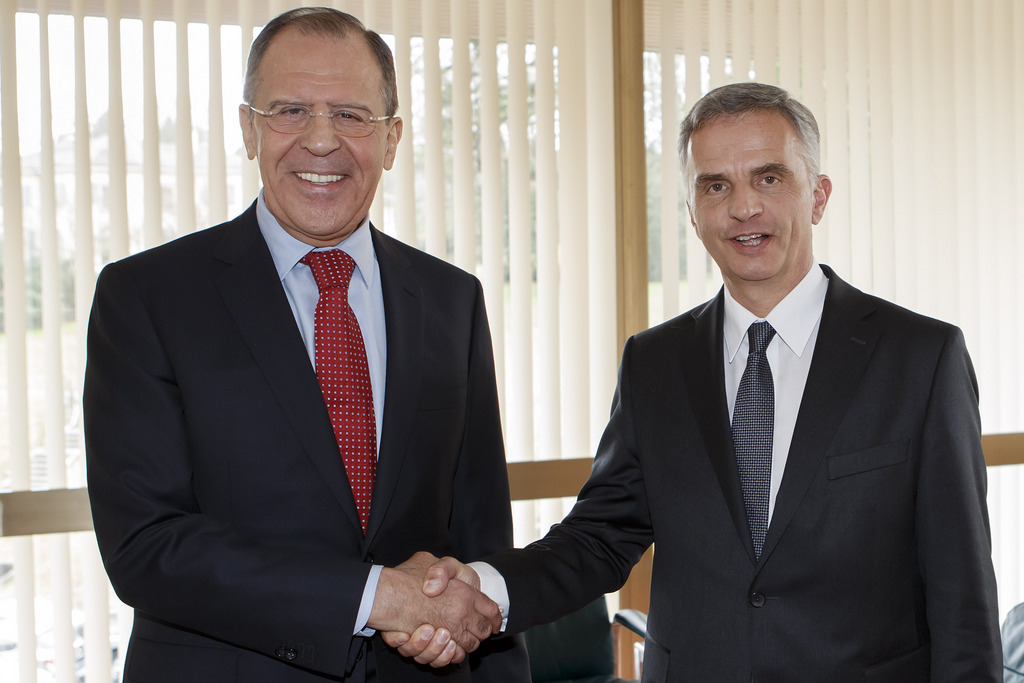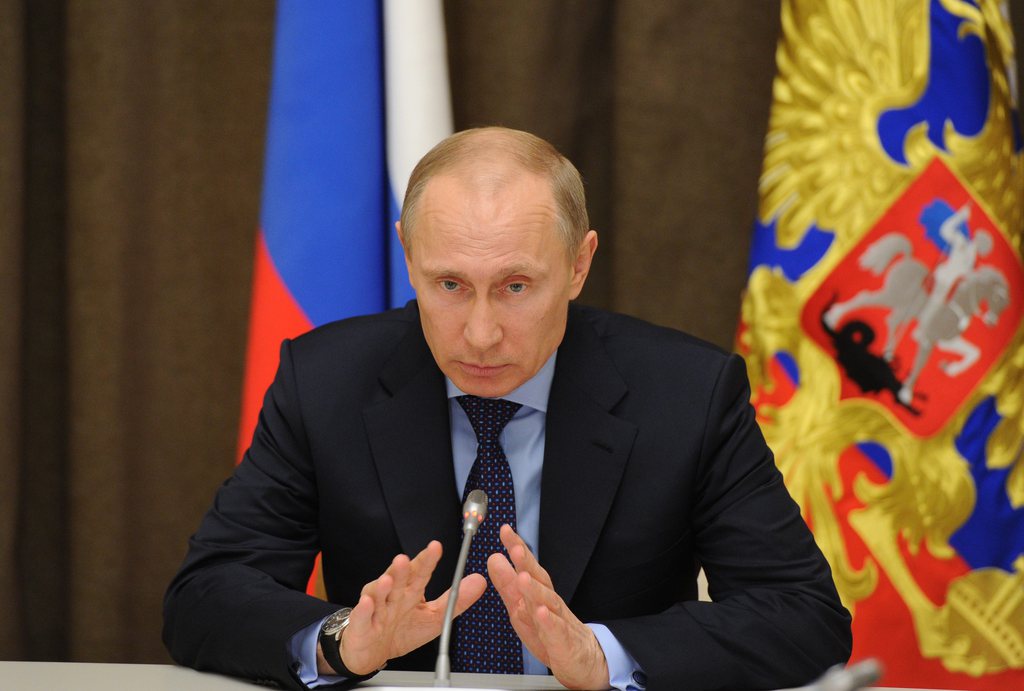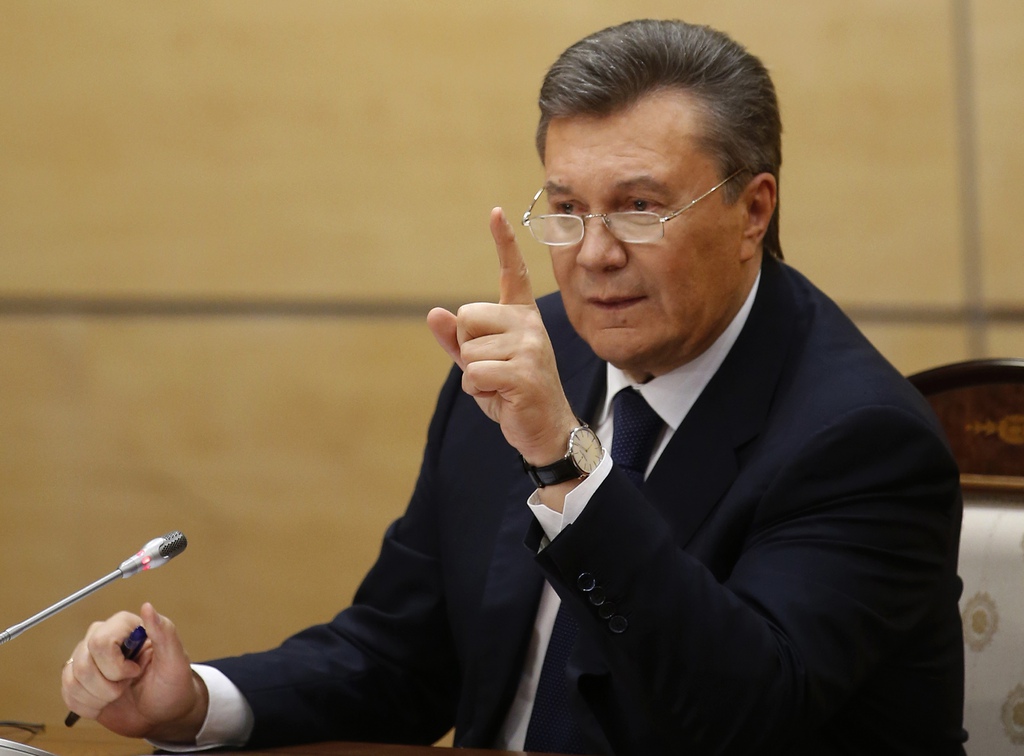Swiss walk tightrope between the West and Russia

With the future status of Crimea still uncertain, Switzerland is making the most of its good standing with Moscow to impose the Organization for Security and Co-operation in Europe (OSCE) as the mediator between Russia and Western nations.
Swiss President and Foreign Minister Didier Burkhalter is in a quandary: how to reconcile Switzerland’s excellent diplomatic relations with Russia and his role as head of the OSCE. His latest statements about the hastily organised Crimean referendum on switching the Black Sea peninsula’s allegiance back to Russia shows how much of a balancing act it is.
In his capacity as OSCE chairman, he described the referendum as “unconstitutional” and said that it should be considered “illegal” in a statement published on March 11, a position repeated over the weekend.
According to an OSCE statement published on Sunday, Burkhalter continued over the past few days discussing the situation in Ukraine and possible solutions at the “highest political levels”.
The Swiss foreign minister said that countries were still ready to solve the crisis by diplomatic means and asked all sides “to refrain from rushing into decisions and unilateral actions that could have wide-ranging consequences”.
He called on OSCE members to resolve the situation through dialogue, with peaceful means and with respect of international law, and not to allow a damaging dynamic to develop further.
Mediator
In an interview published on the website of Swiss public television, SRF, on March 15 he said Switzerland’s position towards the referendum was the same: it is unconstitutional and incompatible with international law.
But asked why Switzerland has not put any pressure on Russia, Burkhalter said this was not necessary.
“Switzerland is by nature a mediator. That is why Switzerland is needed. There are enough other players responsible for threats and sanctions.”
The Kremlin put out a statement on March 14 regretting that Burkhalter, in his OSCE statement, had “failed to address the question of the legality of the coup in Ukraine, or of the current regime in Kiev and the actions of this regime.”
Russia’s ambassador to Bern, Aleksandr Golovin, told swissinfo.ch by email that Russia hoped Switzerland would not adopt the same positions as the European Union. “[We would be particularly unhappy] if Russia is threatened with sanctions. Russia does not seek confrontation either with the EU countries, or with other states over events in Ukraine,” he wrote.
He called on Switzerland, as this year’s OSCE chairman, “to help Ukraine, first and foremost, in its efforts to disarm the militants on the Maidan and other illegal armed groups, and also in efforts to carry out a comprehensive constitutional reform, which would take into account the interests of all Ukraine‘s regions and ethnic groups”.
Burkhalter told SRF that Ukraine needed to think about autonomous regions. “That is something we could help with. Perhaps there should be a move in the direction of more federalism. At the moment the future of Ukraine is open.”
Moscow visit
In Switzerland, too, relations with Russia have given rise to debate since Burkhalter announced his intention of travelling to Moscow this spring to celebrate 200 years of diplomatic relations between Switzerland and Russia, when Ukraine and Crimea will be among the topics on his agenda.
For centre-left Social Democrat parliamentarian Jacqueline Fehr, the trip should be called off. “We cannot celebrate friendship with leaders who are on the warpath,” she told the NZZ am Sonntag newspaper.
The House of Representatives foreign policy committee will discuss the issue at its next meeting. Its president Carlo Sommaruga, another Social Democrat, told the Tribune de Genève that the committee could demand Burkhalter’s visit be cancelled.
“There’s no way there can be a Swiss state visit to Russia if that country commits human rights violations and tramples minority rights in Crimea,” he added.
Swiss journalist and Russia specialist Eric Hoesli disagrees, saying that foreign policy should take a wider view of the situation.
“Didier Burkhalter has shown that he takes his mandate as head of the OSCE seriously,” he said. “It might bother some people, but if the organisation doesn’t play its role in supporting peace and stability in Europe, who will?”
The Crimean crisis has so far not influenced free-trade talks between the members of the European Free Trade Association (EFTA) and the Russia-Belarus-Kazakhstan customs union.
The next meeting will probably take place in April in Switzerland.
The Russia-Belarus-Kazakhstan customs union is the basis for the Eurasian Union, Putin’s major geopolitical project that is threatened by Ukraine’s attempts to build closer ties with the EU.
Close ties
But any sympathy for Russian President Vladimir Putin might soon wear thin if the Ukrainian crisis persists. Relations have become more intense in recent years, highlighted by the award this month of the Russian Order of Friendship to former foreign minister Micheline Calmy-Rey.
“It was given to me for the mediation we carried out between Armenia and Turkey as well as between Moscow and Georgia, which allowed Russia to join the World Trade Organization after Georgia’s opposition was lifted,” she told swissinfo.ch.
She said Switzerland’s closer ties with Russia were the result of efforts to develop relationships with established or emerging powers outside Europe such as China and South Africa.
Hoesli reckons Swiss efforts with Russia paid off handsomely because the United States and the European Union failed to take into account Russian interests after the collapse of the Soviet bloc, favouring the emergence of nationalist leaders such as Putin.
“Since the mediation between Russia and Georgia, ties have been created – personal relationships between Swiss and Russian diplomats,” he added. In particular, Switzerland was able to take part in G20 talks during the Russian presidency, a participation considered vital for the survival of the Swiss financial sector.
Neutrality
For Georges Nivat, a Russian specialist and honorary professor at the University of Geneva, Switzerland must remain strictly neutral during the Ukrainian crisis if it wishes to maintain its privileged status with Russia.
“When governments everywhere are condemning Russia, should the Swiss toe the same line or stand back to protect its role as mediator? Switzerland doesn’t have to follow the EU, as it often has, since it isn’t a member,” he said.
Russia’s reputation as a democracy has taken a beating as it becomes more authoritarian. Opposition members are imprisoned and journalists have been killed while the media are being forced to follow the official line, warns Thérèse Obrecht, president of Reporters without Borders Switzerland and a former correspondent in Moscow.
For Nivat, Switzerland must play its cards carefully as the Putin government remains popular thanks to a higher standard of living.
“He knows how to appeal to Russians’ patriotic chord even if not all his fellow citizens agree with him,” he said. “Switzerland is better off denouncing specific human rights’ violations than attacking the regime.”
Swiss representatives say they do this when they meet their Russian counterparts or when making public statements at the UN Human Rights Council.
(Translated from French by Scott Capper)

In compliance with the JTI standards
More: SWI swissinfo.ch certified by the Journalism Trust Initiative



You can find an overview of ongoing debates with our journalists here. Please join us!
If you want to start a conversation about a topic raised in this article or want to report factual errors, email us at english@swissinfo.ch.